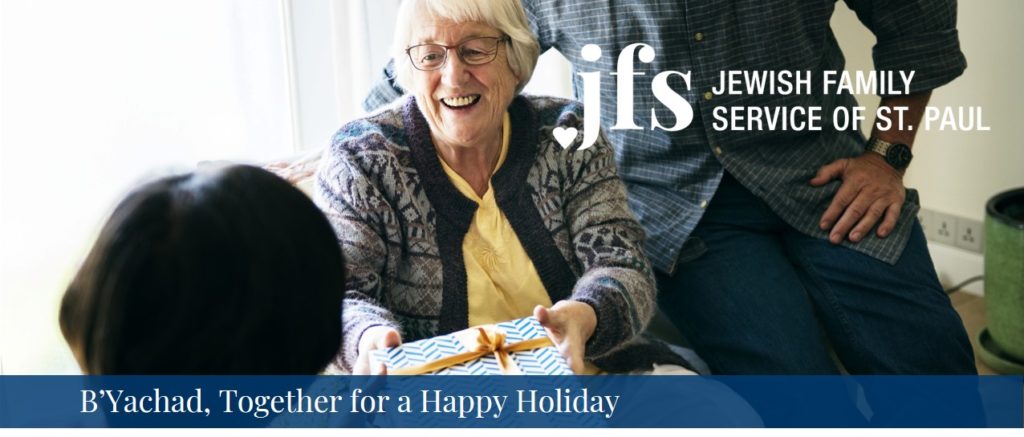Despite COVID Barriers, B’Yachad Brings People Together

Volunteering is an important way JFS expands the reach of its programs and offers opportunities to engage with the agency, ways to “give back.” The annual B’Yachad Gift Bag Program has, for 10 years, offered several ways to volunteer, either by donating, shopping, wrapping, or delivering gifts to people in need emotionally, financially, or spiritually throughout the community. The program is funded exclusively by donations of time and money.
As the full impact and extent of COVID was beginning to become apparent in the spring, B’Yachad planning needed to begin. In Hebrew, b’yachad means “together,” something that presented too much risk this year. As program leaders tried to identify safe ways for people to volunteer, it became apparent that there could be no groups of people wrapping gifts; no in-store shopping; and no greeting people at their front door to deliver gifts.
Asking people to donate to the program online was the safest thing to do. All bags would contain standard items that could be ordered in large quantities online. Gift bags would have to be left on doorsteps. Program leaders created an opportunity to make greeting cards to include in each bag. They would purchase cards to supplement the couple dozen cards they expected to get.
The program was launched, and fundraising began: $36 to provide one bag, $72 to provide two, and so on. From the first day, donations were strong and steady. Gifts came in from people who had never donated before. Several people set up recurring monthly donations so they could support the program all year long. Others asked to support gift bags for Holocaust survivors or chaplaincy clients specifically.
Earlier this year, the Harry Kay Leadership Institute asked JFS CEO Ruth Olkon to attend and present at a round table discussion to help the leadership cohort learn about our work, our challenges and how they might help. Many months later, cohort members Dina Goodman and Marni Gensler reached out to Ruth. They explained that her presentation captured the hearts and minds of those present as they listened intently. The cohort wanted to know if there was a great project or a gift drive they could support.
The annual B’Yachad Gift Bag program was perfect! Typically, recipients prepare a wish list and volunteers shop for items on the list. But because of COVID, it wasn’t safe to ask volunteers to shop. Instead, each bag contained a face mask, hand sanitizer and a grocery gift card from a local store that provides delivery. In the one week before the gift bag items were to be purchased, the Harry Kay Leadership Institute cohort raised enough money to ensure each bag would have a gift card.
Despite all the barriers presented by COVID, volunteers safely delivered gift bags to nearly 185 people. People who are struggling with isolation or loneliness. People experiencing financial hardship. And people who need help believing someone cares. Recipients included chaplaincy and Holocaust survivor clients. Additionally, nine new people donated their time, bringing the total number of volunteers working on this project to 31. This doesn’t include the many people who dropped off hand-made greeting cards at the JFS office. Children and adults made hundreds of beautiful cards. The task resonated with artists and crafters a like. They used glitter and buttons and bows and any number of other creative ways to embellish their cards. “Thank you for giving me an opportunity to finally get to do something for others,” said one card maker. During a therapy session, one JFS client clutched a card she had received. It was made by a child and touched her in a very profound way.
During this time of being apart from one another, so many people and agencies came ‘together’ to make this happen. What a beautiful example of community connection.
